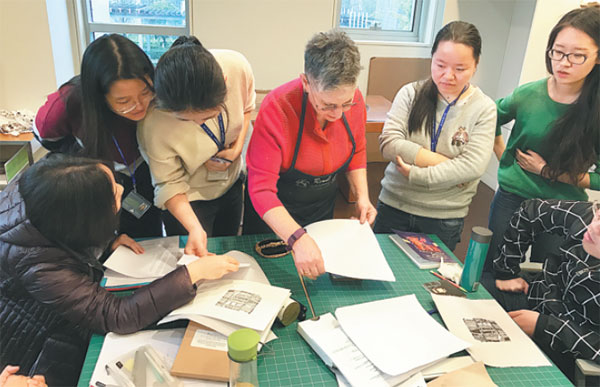At home with liberal arts
By Zhang Zefeng (China Daily) Updated: 2017-04-12 07:17Duke Kunshan University in Jiangsu province, will launch its undergraduate degree courses in 2018, Zhang Zefeng reports.
Tian Hongrui leads a busy life at Duke Kunshan University in East China's Jiangsu province, where he attends the interdisciplinary non-degree program called the "global learning" semester.
He takes courses on social sciences, writing and art with a dozen students from different countries and interacts closely with teachers both from China and the United States.
In addition to his academic interests, he works out at a gym to bond with the other students.
|
Students of the "global learning" semester take a printmaking class taught by Duke professor Merrill Shatzman. |
Tian, 22, is otherwise a senior student of preventive medicine at Peking University Health Science Center.
But intrigued by the idea of receiving world-class education at home, he decided to join the program that focuses on liberal arts and research at Duke Kunshan University, a venture jointly set up by Duke University of the US, Wuhan University and the city of Kunshan, in Jiangsu, in 2013. It has been offering master's programs since 2014.
The program Tian attends also serves as a platform for members of the faculty at the university to prepare for the launch of its full-fledged undergraduate degree courses in the fall of 2018. Both Chinese and foreign students can apply for them from August, with the first batch size expected to be 175.
The students will receive a dual degree from Duke University and Duke Kunshan University, which is accredited by China's Ministry of Education, and they will have the chance to spend at least one semester at Duke University. Duke Kunshan University will implement the liberal arts education model for its undergraduate studies.
Liberal arts education is an idea of training somebody in a manner that their "intelligence can be active, versatile and adaptive" over the course of their whole lives, says Richard Brodhead, president of Duke University.
"We are trying to train students to understand the different faces that belong to every problem," he tells China Daily in Beijing. "We're looking to create something where students aren't the passive receivers of knowledge."
The undergraduate program will offer eight majors, including material science, environmental science and global China studies. The university has prepared a new curriculum with the help of a Duke faculty committee based on general trends in global liberal arts education and higher education in China.
Gao Haiyan, the vice-chancellor for academic affairs at Duke Kunshan University, says the curriculum is both integrated and interdisciplinary.
"Very few universities in the US are doing that. I'm aware that Princeton and Virginia Tech are doing so," she says. "Our integrated science curriculum is really designed for anybody interested in studying here and this new form of integrated learning."
For social sciences, there will be two foundational courses.
"The whole idea is to provide a broad base that we think students interested in social sciences will benefit from," Gao says.
About one third of the students on campus will be from overseas.
"We want to have a diverse student body," says Denis Simon, executive vice-chancellor of Duke Kunshan University, adding that the measure is important to make the university global in appeal.
Nick Peoples from the US came to Duke Kunshan University for the "global learning" semester in 2015. Later he enrolled into a similar Global Health program for relevant knowledge.
"I wanted international experience" in studying global health, he says.
Peoples says he enjoys the discussion-based courses, the small-class environment, research opportunities as well as the rapport between the students and teachers.
"The campus is a very closely-knit community. So, we know our professors very well, some of them on first name basis," he adds.
The university will provide its undergraduate students access to its Global Health Research Center, Environment Research Center, Institute of Applied Sciences and Engineering and a computer laboratory. Students can also tap into research opportunities at both Duke University and Wuhan University.
"If students can work in the cutting edge of knowledge, they can bring that knowledge to the classroom, and that can have a positive impact on their overall education experience," says Simon.
The school will also offer merit-based and need-based scholarships to qualified Chinese and foreign students.
Contact the writer at zhangzefeng@chinadaily.com.cn
- 'Cooperation is complementary'
- Worldwide manhunt nets 50th fugitive
- China-Japan meet seeks cooperation
- Agency ensuring natural gas supply
- Global manhunt sees China catch its 50th fugitive
- Call for 'Red Boat Spirit' a noble goal, official says
- China 'open to world' of foreign talent
- Free trade studies agreed on as Li meets with Canadian PM Trudeau
- Emojis on austerity rules from top anti-graft authority go viral
- Xi: All aboard internet express












